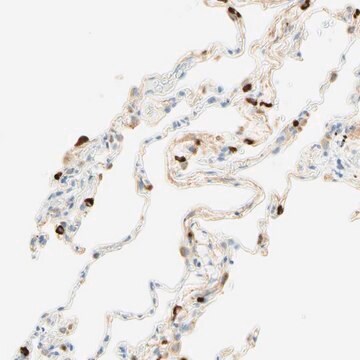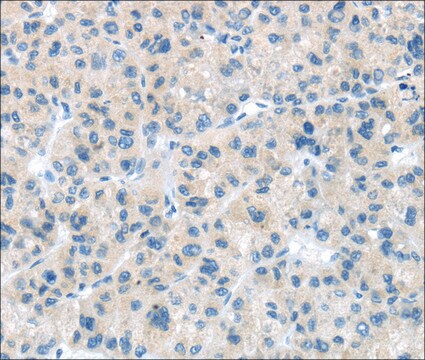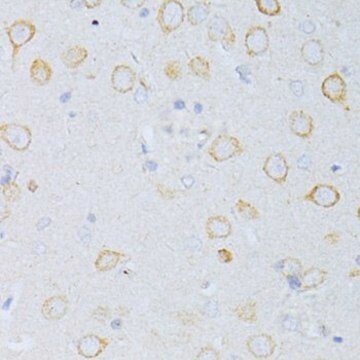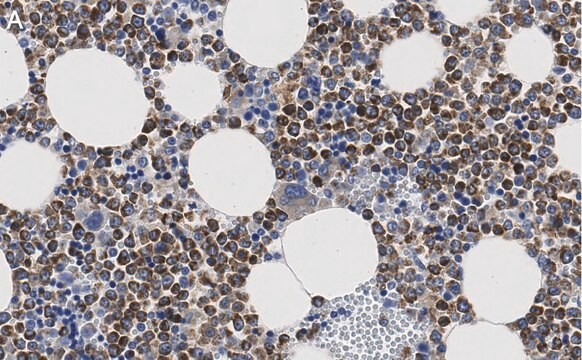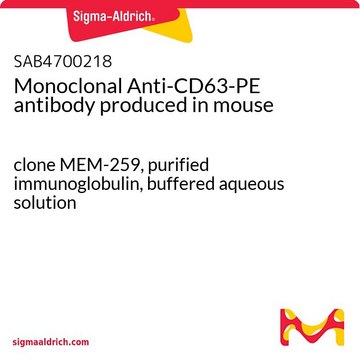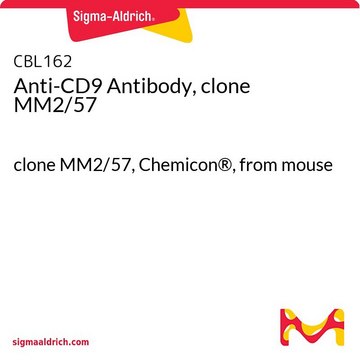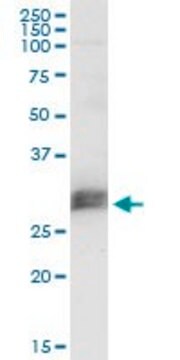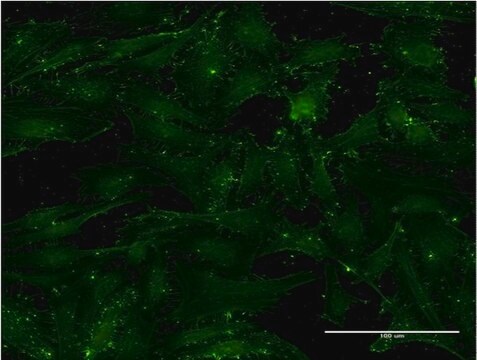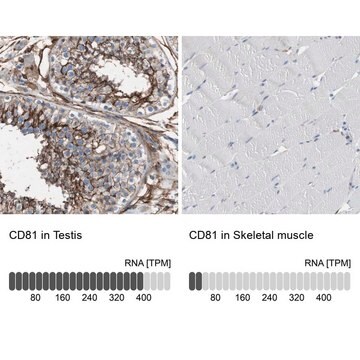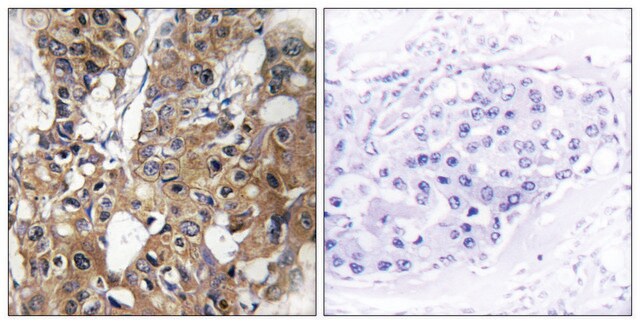SAB4700215
Monoclonal Anti-CD63 antibody produced in mouse
clone MEM-259, purified immunoglobulin, buffered aqueous solution
Autenticatiper visualizzare i prezzi riservati alla tua organizzazione & contrattuali
About This Item
Codice UNSPSC:
12352203
NACRES:
NA.41
Prodotti consigliati
Origine biologica
mouse
Coniugato
unconjugated
Forma dell’anticorpo
purified immunoglobulin
Tipo di anticorpo
primary antibodies
Clone
MEM-259, monoclonal
Stato
buffered aqueous solution
Reattività contro le specie
human
Concentrazione
1 mg/mL
tecniche
flow cytometry: suitable
Isotipo
IgG1
N° accesso NCBI
N° accesso UniProt
Condizioni di spedizione
wet ice
Temperatura di conservazione
2-8°C
modifica post-traduzionali bersaglio
unmodified
Informazioni sul gene
human ... CD63(967)
Descrizione generale
Cluster of differentiation 63 (CD63), also known as melanoma 1 antigen, is encoded by the gene mapped to human chromosome 12q13.2. The encoded protein belongs to the transmembrane 4 superfamily (TM4SF). CD63 is an integral membrane glycoprotein expressed in late endosomes and lysosomes and is also present in the platelet dense granule membrane.
The antibody MEM-259 reacts with CD63 (LAMP-3), a 40-60 kDa tetraspan glycoprotein expressed by granulocytes, platelets, T cells, monocytes/macrophages and endothelial cells. Cell surface exposition of CD63 is usually activation-dependent.
Immunogeno
HPB-ALL T cell line
Applicazioni
Monoclonal Anti-CD63 antibody produced in mouse has been used in flow cytometry and confocal imaging.
The reagent is designed for Flow Cytometry analysis. Suggested working dilution for Flow Cytometry is 2 μg/mL of sample. Indicated dilution is recommended starting point for use of this product. Working concentrations should be determined by the investigator.
Azioni biochim/fisiol
Cluster of differentiation 63 (CD63) is one of the platelet activation marker, which plays a vital role in platelet aggregation, adhesion to collagen, uptake of oxidized low-density lipoprotein (LDL) in vitro and regulation of angiogenesis. Inadequate expression of CD63 results in the autosomal recessive inherited disorder, Hermansky-Pudlak syndrome. CD63 is associated with various cellular functions, such as cellular adhesion, cell differentiation, migration, carcinogenesis and tumor progression. CD63 is highly expressed in the initial stage of Merkel cell carcinoma and decreased in later stages; therefore, CD63 is considered to be a potential prognostic factor for this malignancy.
Caratteristiche e vantaggi
Evaluate our antibodies with complete peace of mind. If the antibody does not perform in your application, we will issue a full credit or replacement antibody. Learn more.
Stato fisico
Solution in phosphate buffered saline, pH 7.4, with 15 mM sodium azide.
Esclusione di responsabilità
Unless otherwise stated in our catalog or other company documentation accompanying the product(s), our products are intended for research use only and are not to be used for any other purpose, which includes but is not limited to, unauthorized commercial uses, in vitro diagnostic uses, ex vivo or in vivo therapeutic uses or any type of consumption or application to humans or animals.
Non trovi il prodotto giusto?
Prova il nostro Motore di ricerca dei prodotti.
Codice della classe di stoccaggio
10 - Combustible liquids
Punto d’infiammabilità (°F)
Not applicable
Punto d’infiammabilità (°C)
Not applicable
Scegli una delle versioni più recenti:
Possiedi già questo prodotto?
I documenti relativi ai prodotti acquistati recentemente sono disponibili nell’Archivio dei documenti.
I clienti hanno visto anche
Detection of phosphatidylserine-positive exosomes as a diagnostic marker for ovarian malignancies: a proof of concept study
Lea J, et.al.
Oncotarget, 8, 14395-14407 (2017)
Jayanthi Lea et al.
Oncotarget, 8(9), 14395-14407 (2017-01-26)
There are no suitable screening modalities for ovarian carcinomas (OC) and repeated imaging and CA-125 levels are often needed to triage equivocal ovarian masses. Definitive diagnosis of malignancy, however, can only be established by histologic confirmation. Thus, the ability to
Gene expression signature associated with BRAF mutations in human primary cutaneous melanomas
Kannengiesser C
Molecular Oncology, 1, 425-430 (2008)
Tra-Ly Nguyen et al.
Cancer research, 78(18), 5384-5397 (2018-07-29)
The mTOR is a central regulator of cell growth and is highly activated in cancer cells to allow rapid tumor growth. The use of mTOR inhibitors as anticancer therapy has been approved for some types of tumors, albeit with modest
Improved metabolic control decreases platelet activation markers in patients with type-2 diabetes.
Eibl N
European Journal of Clinical Investigation, 34, 205-209 (2004)
Il team dei nostri ricercatori vanta grande esperienza in tutte le aree della ricerca quali Life Science, scienza dei materiali, sintesi chimica, cromatografia, discipline analitiche, ecc..
Contatta l'Assistenza Tecnica.